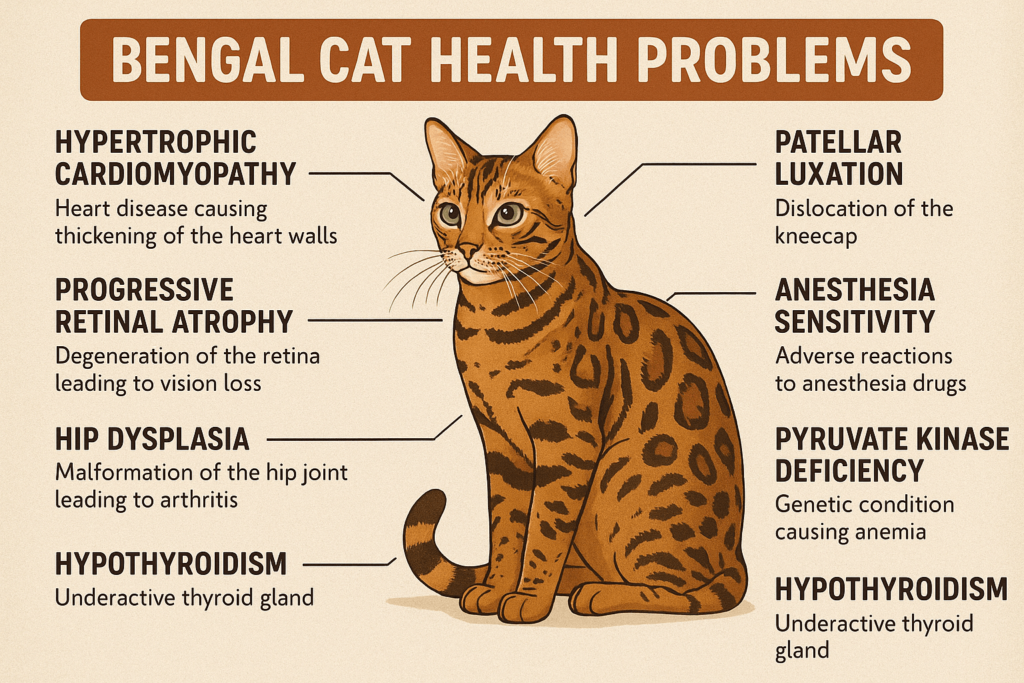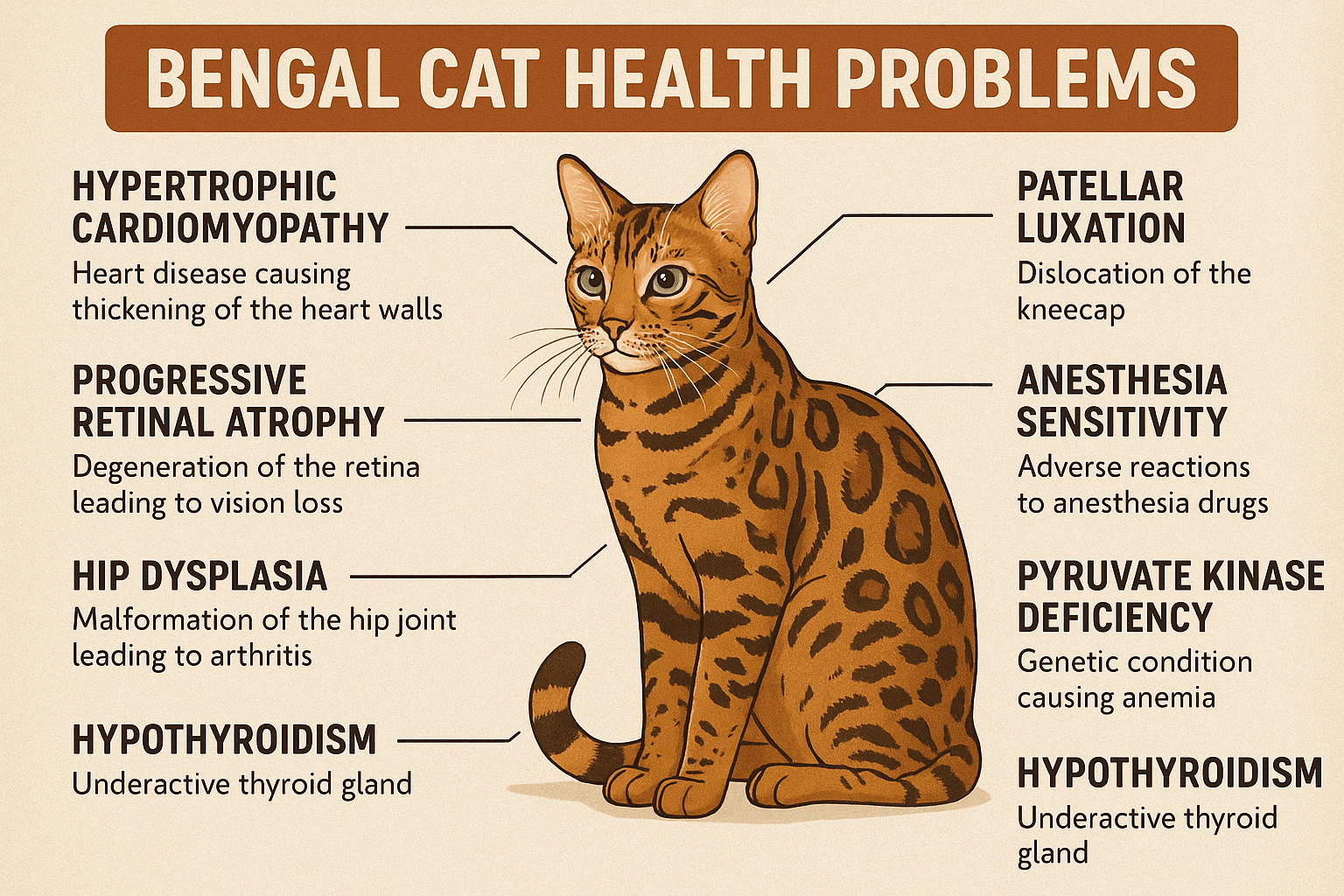Bengal Cat Health Problems: What Every Owner Should Know
Bengal cats are known for their striking appearance, playful personalities, and energetic nature. However, like all breeds, they are prone to certain health issues that owners need to be aware of. While Bengals are generally robust and healthy, understanding potential health problems can help you provide the best care possible and ensure your feline companion lives a long, happy life. In this article, we’ll explore common Bengal cat health concerns, preventive measures, and tips for maintaining their well-being. Whether you’re a new Bengal owner or simply curious about the breed, this guide will equip you with essential knowledge to keep your furry friend thriving.
Common Health Issues in Bengal Cats
Bengal cats may face specific health challenges due to their genetics and active lifestyle. Recognizing these conditions early can make a significant difference in managing them effectively.
Hypertrophic Cardiomyopathy (HCM):
This is a common heart condition in Bengals where the heart muscle thickens, potentially leading to heart failure if untreated.Chronic Kidney Disease:
Bengals, like many cats, can develop kidney issues as they age, affecting their ability to filter waste properly.Flat Chest Syndrome:
A congenital condition seen in kittens, flat chest syndrome causes compression of the ribcage, which can lead to breathing difficulties.Luxating Patella:
This joint problem occurs when the kneecap slips out of place, causing discomfort or lameness in affected cats.Allergies and Skin Conditions:
Bengals have sensitive skin and may suffer from allergies triggered by food, environmental factors, or flea bites.
Being aware of these potential health problems allows you to monitor your Bengal closely and seek veterinary care promptly when needed.

Preventive Care Tips for Bengal Cats
Prevention is key to keeping your Bengal cat healthy and minimizing the risk of serious health issues. Incorporate these practices into your routine to support their overall well-being.
Schedule Regular Vet Check-Ups:
Annual or biannual visits to the vet help detect early signs of illness and ensure vaccinations are up-to-date.Provide a Balanced Diet:
Feed your Bengal high-quality protein-rich food to meet their nutritional needs and reduce the risk of obesity-related issues.Encourage Hydration:
Bengals are prone to urinary tract issues, so ensuring they drink plenty of water is crucial for preventing kidney problems.Maintain Dental Health:
Brush your Bengal’s teeth regularly and provide dental treats to prevent periodontal disease, which can affect overall health.Monitor Their Activity Levels:
Keep an eye on your cat’s energy and behavior—sudden changes could indicate underlying health concerns.
By prioritizing preventive care, you can catch potential problems early and give your Bengal the best chance at a healthy life.
Check this guide 👉Bengal Cat vs Maine Coon: Best 7 Expert Tips!
Check this guide 👉Do Bengal Cats Shed? Best 7 Expert Tips!
Check this guide 👉How Long Do Bengal Cats Live? Best 7 Expert Tips!
Common Bengal Health Problems | Preventive Measures |
|---|---|
Hypertrophic Cardiomyopathy (HCM) | Schedule regular cardiac screenings |
Chronic Kidney Disease | Ensure proper hydration and diet |
Flat Chest Syndrome | Work with ethical breeders |
Luxating Patella | Maintain a safe environment for joints |
Allergies and Skin Conditions | Use hypoallergenic products and grooming |
Signs Your Bengal Might Be Unwell
Early detection of health problems is vital for effective treatment. Look out for these warning signs that may indicate your Bengal needs medical attention.
Changes in Appetite:
A sudden refusal to eat or overeating could signal digestive or systemic issues.Lethargy or Reduced Activity:
If your usually energetic Bengal seems unusually tired, it may point to an underlying health concern.Excessive Grooming or Hair Loss:
Over-grooming often indicates stress, allergies, or skin infections requiring investigation.Frequent Urination or Straining:
These symptoms may suggest urinary tract infections or kidney problems, which are common in Bengals.Difficulty Breathing:
Labored breathing can result from respiratory issues or heart conditions like HCM and should be addressed immediately.
Noticing these signs early enables you to act quickly and safeguard your Bengal’s health.
How to Choose a Healthy Bengal Kitten
Selecting a healthy Bengal kitten starts with thorough research and careful observation. Here’s how to ensure you bring home a happy, healthy feline companion.
Research Reputable Breeders:
Choose breeders who prioritize health testing and transparency about their breeding practices.Ask About Genetic Testing:
Responsible breeders test for hereditary conditions like HCM and provide documentation of clear results.Observe the Kitten’s Behavior:
Active, curious kittens with bright eyes and clean coats are typically in good health.Check for Physical Symptoms:
Look for signs of illness such as nasal discharge, sneezing, or limping during your visit.Meet the Parents:
Meeting the kitten’s parents gives insight into potential temperament and inherited traits.
Taking these steps ensures you adopt a Bengal kitten with the best chance of living a long, healthy life.
Understanding Bengal-Specific Traits
Bengals possess distinct traits that set them apart from other breeds, but these characteristics can also influence their health. Here’s what you need to know about their unique makeup.
High Energy Levels:
Bengals require ample exercise to stay fit and avoid obesity-related health issues.Short, Luxurious Coat:
Their sleek coat is low-maintenance but still requires regular grooming to prevent skin irritations.Curious Nature:
Bengals’ adventurous spirit can lead to accidents, so creating a safe home environment is essential.Intelligence and Playfulness:
Mental stimulation through toys and activities reduces stress and promotes overall well-being.Sensitivity to Change:
Bengals may react negatively to abrupt changes in routine, potentially impacting their mental and physical health.
Understanding these traits helps tailor your care approach to suit your Bengal’s individual needs.
Creating a Safe Home Environment
A secure and enriching environment plays a crucial role in maintaining your Bengal’s health. Consider these tips to create a Bengal-friendly space.
Cat-Proof Your Home:
Remove hazardous items like small objects, toxic plants, and exposed wires to prevent accidents.Provide Vertical Space:
Install cat trees or shelves to satisfy their climbing instincts and reduce joint strain.Offer Mental Stimulation:
Puzzle toys and interactive games keep their sharp minds engaged and prevent boredom-related behaviors.Ensure Fresh Water Access:
Place multiple water stations around the house to encourage hydration and support kidney health.Limit Stress Triggers:
Minimize loud noises and chaotic environments to help your Bengal feel calm and secure.
A thoughtfully designed home supports both the physical and emotional health of your Bengal.
Managing Bengal-Specific Diets
Diet plays a pivotal role in preventing and managing Bengal cat health problems. Here’s how to tailor their nutrition for optimal wellness.
Prioritize High-Quality Protein:
Bengals thrive on diets rich in animal-based proteins, which mimic their natural carnivorous tendencies.Avoid Artificial Additives:
Steer clear of foods containing artificial colors, flavors, or preservatives that may trigger allergies or digestive issues.Incorporate Wet Food:
Wet food increases moisture intake, supporting urinary and kidney health in Bengals.Monitor Portion Sizes:
Overfeeding can lead to obesity, which exacerbates conditions like HCM and arthritis.Consult Your Vet for Special Needs:
For Bengals with sensitivities or existing health issues, custom diets prescribed by a vet can make a significant difference.
A balanced diet tailored to your Bengal’s needs lays the foundation for lifelong vitality.
Frequently Asked Questions About Bengal Cat Health Problems
What is the most common health issue in Bengal cats?
Hypertrophic Cardiomyopathy (HCM) is one of the most prevalent health concerns in the breed.
Are Bengal cats prone to urinary tract issues?
Yes, Bengals can experience urinary tract problems, including infections and blockages, so hydration is critical.
Can Bengal cats live with chronic kidney disease?
With proper management, including diet and medication, Bengals can live comfortably despite kidney issues.
How can I prevent skin allergies in my Bengal?
Use hypoallergenic grooming products, maintain a clean environment, and consult your vet about dietary adjustments.
When should I take my Bengal to the vet?
Visit the vet if you notice unusual behavior, appetite changes, or physical symptoms like lethargy or difficulty breathing.
Caring for Your Bengal Cat’s Long-Term Health
Owning a Bengal cat comes with the responsibility of understanding their unique health needs. By staying informed about potential health problems, practicing preventive care, and seeking prompt veterinary attention when necessary, you can ensure your Bengal thrives for years to come. Remember, a healthy Bengal is a happy Bengal—one who will reward you with endless love, energy, and companionship. With dedication and vigilance, you can enjoy a fulfilling relationship with your feline friend while keeping them in peak condition.
Dog Tapeworm Life Cycle: Best 7 Expert Tips! – Learn how tapeworms infect dogs, spot symptoms, and break the cycle with expert prevention strategies.
Anxious Cat Body Language: Best 7 Expert Tips! – Learn to spot signs of stress, understand triggers, and help your cat feel safe and relaxed.
Anxious Dog Body Language: Best 7 Expert Tips! – Learn to spot signs of anxiety, respond effectively, and help your dog feel safe and secure.
Is Breeding Dogs Bad? Best 7 Expert Tips! – Explore the ethics, benefits, and risks of dog breeding to make informed decisions for a better future.





